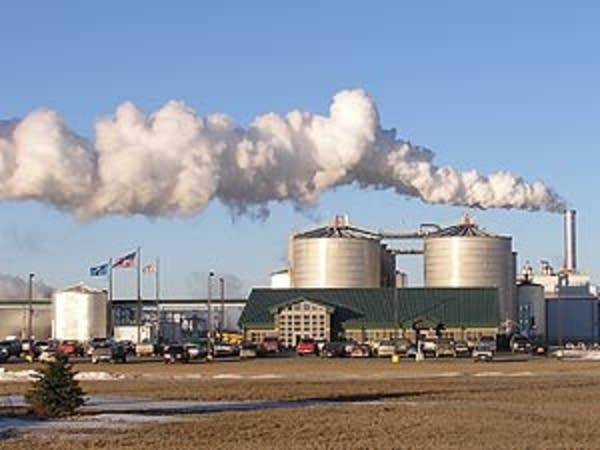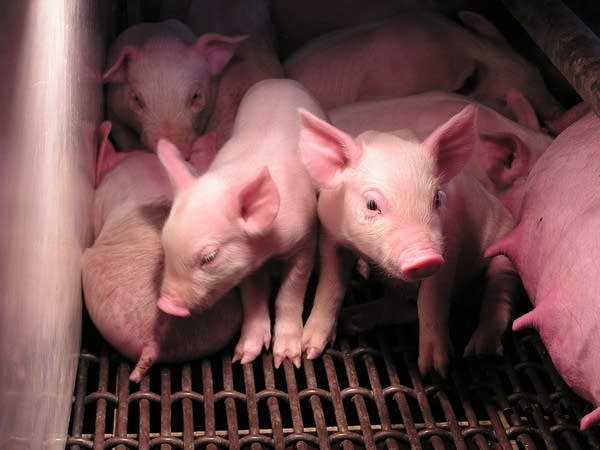Rising corn prices heat up ethanol tariff debate
Go Deeper.
Create an account or log in to save stories.
Like this?
Thanks for liking this story! We have added it to a list of your favorite stories.

Ethanol has become a wedge issue in the world of agriculture, dividing farmers into groups of winners and losers. The big winners are grain producers. They've received huge profits as the price of corn and just about every other grain rises.
The losers are mainly livestock farmers, who have to pay significantly higher costs for their livestock feed, most importantly, corn. Hog farmers have lost $30 or more per animal since last fall. Southwest Minnesota hog producer Randy Spronk said the high costs have forced some farmers out of business.
"They've left livestock production not due to their mismanagement or to anything that they did. It's a public policy that promoted a gas tank over the top of the grocery cart," said Spronk.
"It's a public policy that promoted a gas tank over....the grocery cart."
Spronk said eliminating the ethanol import tariff would help hog producers. The tariff sharply limits ethanol imports and helps drive up the cost of corn. Foreign companies pay a 54 cent tax on every gallon of ethanol they ship to the U.S.
Turn Up Your Support
MPR News helps you turn down the noise and build shared understanding. Turn up your support for this public resource and keep trusted journalism accessible to all.
By reducing foreign competition the tariff helps the U.S. ethanol industry expand, using more corn and driving grain prices even higher. Southwest Minnesota hog producer Randy Spronk said the tariff is an unfair subsidy for the U.S. ethanol industry.
"It really bothers me that there's a public policy that's subsidizing one end user to the detriment of the others," said Spronk. "There's an issue there."
The ethanol import tariff expires at the end of the year. Groups representing hog, cattle, chicken, milk, turkey and egg producers are lobbying to let it die at that time. They say not only are ethanol policies hurting some farmers, but they're also pushing up food prices, domestically and globally.
On the other side of the issue is the ethanol industry.
"We're anticipating that the tariff will be extended," said Brian Jennings with the American Coalition of Ethanol.

Jennings said the groups that want to eliminate the tariff are oversimplyfying things. He disputes the argument that the tariff prevents foreign ethanol from entering the U.S.
"In fact, last year the United State imported over 500 million gallons of ethanol from Brazil. We imported almost 200 million gallons of ethanol from other countries," said Jennings.
That's about 10 percent of U.S. ethanol use last year. An Iowa State University study suggests that ending the ethanol import tariff would not provide significant relief for livestock producers. It shows more foreign ethanol would enter the U.S.
The increased competition would decrease U.S. production by about seven percent. That would ease demand for corn, but only enough to drop prices a few cents a bushel. Simla Tokgoz co-wrote the report. She said lifting the tariff could also mean trouble for some older U.S. ethanol producers.
"Ethanol plants that are relatively inefficient are going to be affected more," said Tokgoz. "Ethanol price is going to be decreasing, so their profit margins are going to decline."
There's also an environmental concern to removing the ethanol import tariff. If the U.S. market is opened, it could encourage deforestation practices in Brazil and other nations, as farmers expand production of sugar cane and other crops to make ethanol for the U.S. market.
Sidney Weintraub is with the Center for Strategic and International Studies, a Washington think tank. He said no one can be certain what Congress will do, but he believes they'll renew the ethanol import tariff.
"I wouldn't expect much to get done," said Weintraub. "Because the interests in favor of those things, are really quite powerful and quite influential."
He said that includes corn and other farm groups that last year successfully pushed for expanded ethanol production.
If Congress renews the import tariff, hog producers like Randy Spronk will be disappointed. He said he doesn't oppose ethanol, he just thinks they have an unfair advantage over livestock producers.




